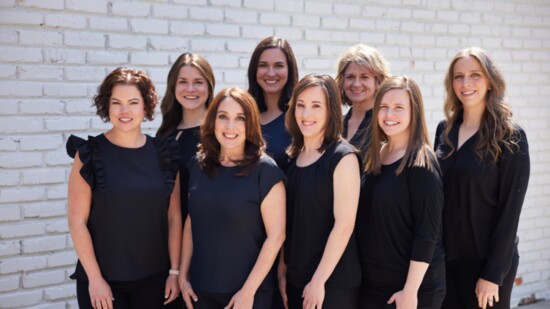If you haven’t paid much attention to your hearing health, Dr. Elizabeth Welch wants to deliver a message that’s (not too) loud and clear: make an appointment and get an exam.
“In many cases, hearing loss is so gradual that people don’t even notice until it has progressed,” she says. “I highly recommend getting tested so that you know your baseline. Then if subsequent tests indicate you’ve experienced a loss, it can be treated.”
Dr. Welch takes hearing to heart. She’s been in private practice for nearly 30 years and since 2009 has owned HearTN, a Franklin-based audiology practice with additional offices in Spring Hill, Chattanooga and Trenton, Georgia. Her career and her practice are lifelong passions. “I can’t think of anything I’d rather do or anything else I ever wanted to do,” she says.
Dr. Welch says that hearing loss is not necessarily an age-related condition, and people shouldn’t be quick to write off a decline in their hearing as a normal part of aging. For example, with the prevalence of earbuds, people’s ears take quite a beating on a regular basis. Who hasn’t gradually elevated the volume to the point that it's cranked to concert-level decibels?
“It doesn’t matter if you’re five or 105, loss is loss and normal is normal,” she says. The numbers tell the story as 1-of-8 people over the age of 12 have measurable hearing loss. The number increases to 1-of-3 by age 65. Hearing loss also has a strong correlation to early-onset dementia.
In 2017, The Lancet, a British medical journal that has been published weekly for 200 years, presented a study revealing that 35
percent of cognitive decline can be attributed to 16 different risk factors, of which the leading modifiable risk factor is hearing loss.
“That means if we treat hearing loss, we can possibly reduce the rate of cognitive decline,” says Dr. Welch. “People with hearing loss are at a greater risk of developing cognitive decline earlier than their normal-hearing peers.”
One of the more prevalent issues Dr. Welch encounters these days is tinnitus, a benign condition more commonly known as “ringing in the ears.” Nearly 50 million Americans have tinnitus and about a million of those cases are severe enough to require treatment. Dr. Welch has been a trained tinnitus provider for more than 20 years.
“Many audiologists stay away from treating tinnitus, but I enjoy the challenge,” she says. “Tinnitus almost always is accompanied by hearing loss. Usually that means some level of measurable decrease, and the ringing sensation is the result of the brain’s attempt to compensate for what’s missing. It’s a phantom sound, but it’s very real to the patient.”
In the past, there was very little an audiologist could do to treat tinnitus but that changed in early 2023 when the FDA approved a new treatment called Lenire, a non-invasive device that introduces gentle pulses to the patient’s tongue while soothing sounds are played through headphones. This bimodal neuromodulation treatment helps to ease the severity of tinnitus and has an 80 percent success rate. HearTN was the first audiology practice in Tennessee to provide Lenire treatment for its patients. Of course, in the Nashville area, tinnitus is common among musicians but also among people who work in loud environments like construction or certain hospitality and entertainment venues.
Still, when it comes to hearing loss, most people think of treatment in the form of hearing aids. To say that hearing aid technology has come a long way in recent years is quite an understatement. The devices are discreet, comfortable and feature Bluetooth connectivity with everyday gear like smartphones, tablets and TVs.
“Over-the-counter hearing aids have brought more attention to hearing loss,” Dr. Welch says. “And now that they can be paired with the devices you use every day, patients are inclined to embrace hearing aids when there used to be resistance. People are more in tune with their health than ever, so they are starting treatment earlier, and improving their quality of life sooner.” With a routine exam, Dr. Welch and her team at HearTN can help determine whether a patient is a good candidate for hearing aids or Lenire.
As with many forms of healthcare, hearing aids are financially out of reach for some patients. That’s why Dr. Welch started Hearing Connections, an organization that works to make hearing healthcare more affordable. “Even though Williamson County is regarded as a high-income area, there are still some people who cannot afford hearing aids, and I don’t want money to get in between people and the care they need,” she says. “Hearing Connections accepts donated hearing aids and refurbishes them. Then in exchange for the service, Hearing Connections patients will pay a small fee and donate some time to another nonprofit.”
The spirit behind Hearing Connections is an extension of HearTN itself. “My team is our family,” says Dr. Welch. “We enjoy hanging out, even outside of work. I think our patients pick up on the camaraderie and appreciate that this is where we want to be and that it genuinely makes us happy to help them enjoy an improved quality of life. They can see it immediately and it gains their trust. They know we’re going to make the right recommendation, whether they need hearing aids or not.”
In fact, it’s a message that’s made loud and clear. HearTN.com
